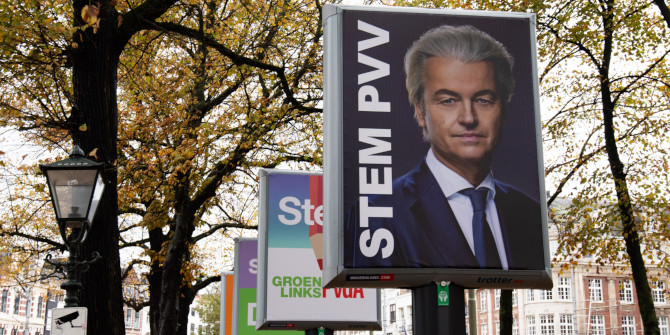Have the financial crisis, the Covid-19 pandemic, and climate change exposed fundamental weaknesses in capitalism? John L. Campbell and John A. Hall write that while contemporary economists and policymakers tend to ignore the political and social dimensions of capitalism, some of the great economists of the past did not make the same mistake. Drawing on these insights, they lay out what capitalism needs to meet the challenges of the future.
One of the strangest, even thrilling experiences of the last fifteen years has been the presence of endless articles in the Financial Times and the Economist discussing crises in capitalism. The authors of these pieces have realised that markets do not function seamlessly and perfectly, but need social and political foundations – which they fail to specify. In a new book, we spell out what capitalism needs, drawing on the ideas of great but unduly neglected economists of the past including Friedrich List, Joseph Schumpeter, John Maynard Keynes and Albert Hirschman – but with most attention being paid to Adam Smith and Karl Polanyi.
Smith did not love capitalism, often indeed criticising the idiocies of frivolous consumption, but he supported this form of society because it had the capacity to provide a form of social stability that would replace the power systems of the past. What mattered was that everyone was on a societal escalator, desperately trying to catch up with those above, running and running until they died.
For this to work everyone had to feel that they had a place on the escalator, however humble. To that end he encouraged states to provide all sorts of equalising policies, above all because he felt that wealth came from the industriousness of the lower orders, that is, from human capital. He advocated a world of high wages and low profits, arguing that the opposite – one in which capitalists gained monopolistic advantages at the expense of workers – would lead to ruin. States had to protect capitalist society from capitalists; states needed autonomy and intelligence.
Polanyi came from a very different Central European world, but his rather pessimistic views add to Smith’s and speak to us now with special clarity. His central insight is contained in a phrase: capitalism can demand so much change, cause such disruption, that sooner or later “society will seek to protect itself.” The organic nationalism of fascism was one such form, which he dreaded; it nearly destroyed the world.
The postwar world did much better. Capital and labour reached an historic class compromise. The world witnessed the emergence of embedded liberalism, where markets flourished within political constraints. Thanks to war and depression wiping out vast amounts of wealth the capitalist world witnessed the great compression – levels of income and wealth inequality lower than they had been in many decades. The escalator worked as the middle class grew in many countries. The result was the greatest period of prosperity and peace in the history of the advanced world.
Globalisation has changed the structure of opportunities. Some can swim in larger worlds, but others are now nationally caged.
But history is on the move again, and it is quite right to worry about the social and political foundations of the world in which we live. Capitalist power has increased, especially in the United States, leading to the world of high profits and low wages that scared Smith. The great compression was never inherent to capitalist society. It has gone now. The rich have learned how to protect themselves, making it harder for people to imagine that the escalator is still working, at least for themselves.
More importantly, globalisation has changed the structure of opportunities. Some can swim in larger worlds, but others are now nationally caged. Those left behind blame the cosmopolitans, most notably the super-rich who seem to be unobstructed by national borders and have no particular allegiance to their homeland. This is the social base for populism. The problems are real, though the politics that follow – directed against immigrants and other minorities – are often dangerous, self-defeating and repulsive.
Such populism would not be doing so well without leadership from above, as Brexit so clearly demonstrated. This speaks to something else. Thanks to the rise of neoliberalism and the belief that less government is always good for capitalism, the capacities of states to compensate for the problems that capitalism generates and faces – not just the financial crisis but the Covid-19 pandemic, cybersecurity threats and, above all, climate change – have eroded. We certainly lack the autonomous state that Smith felt to be necessary.
We are in the world that Polanyi feared. These are not just problems for the United States. Nationalist parties have scored significant victories in recent national elections throughout much of Europe, further undermining social cohesion and politicising social divisions. Denmark is especially interesting as it retains high levels of welfare for Danes but far less for immigrants, if they can get in at all. The same is true of other Scandinavian countries as well as those on the continent.
Capitalism now needs greater levels of social cohesion and increased state capacity. This is also what we want. But we are not naïve: the dictum of the Rolling Stones – “that you can’t always get what you want but sometimes you get what you need” – does not apply now. What is needed does not seem to be on the agenda, which is why our book lays out several scenarios for the future.
For more information, see the authors’ new book, What Capitalism Needs: Forgotten Lessons of Great Economists (Cambridge University Press, 2021)
Note: This article gives the views of the author, not the position of EUROPP – European Politics and Policy or the London School of Economics. Featured image: Going to Work by L. S. Lowry (Public Domain)




